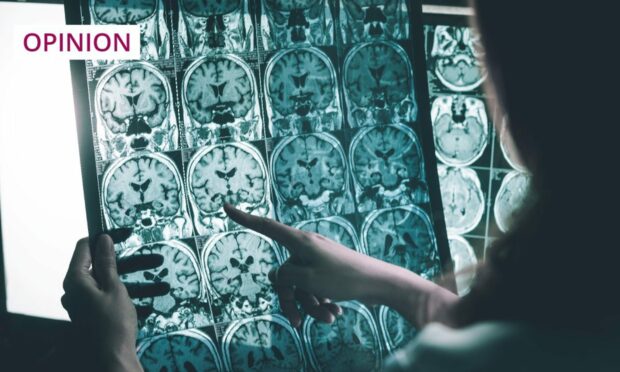When you look at all the ills and travails abroad in the world today, you might be forgiven for thinking Pandora has gone and opened the damn box again.
You know, the one in Greek mythology that unleashed all the curses against humanity. But never forget that the last thing to emerge from the box was hope.
That is what arrived this week, thanks to donanemab, the antibody drug being hailed as a turning point in the battle against Alzheimer’s.
Early trials show the breakthrough treatment can slow down progression of this cruel disease, and might even be the first step towards Alzheimer’s becoming a long-term, treatable condition, like diabetes or asthma.
And that truly does mean hope for millions of people around the world facing the stark reality of this vicious illness, either suffering it for themselves, or seeing it strip away their loved ones from the world, knowing there’s nothing they can do. I know where that bleak hopelessness sits in the heart, and how heavily it weighs on the soul.
I lost my father to Alzheimer’s. Slowly, bit by bit, memory by memory, it took who he was and reduced him to a shell.

The big, vibrant character who was there all through my life was chipped away over years, starting with forgetting which newspapers he was going to pick up from the shop, to not knowing his own children. To not knowing himself.
His last years were spent in a hospital ward. Visits were purgatory. I could barely bring myself to go to see him, knowing how deeply that was going to cut, how much it was going to hurt.
And with that came the shame of wishing he was gone. My father had vanished long before. What was left was a husk that looked like him in a ward full of men at various stages of the same doom.
Then came the guilt of not knowing if I wanted him to pass for his sake or for mine.
When he did eventually leave us, I mourned. And I felt a weight had lifted. I live with that still.
Alzheimer’s means I live with guilt and in fear
And always at the back of my mind is whether that might be my future, too. Dementia took my dad. And my uncle. And my aunt. And a cousin. So, yes, the prospect haunts me. It scares me. Every senior moment comes with an: “Is this it starting?” in the back of my mind.
Donanemab isn’t a cure. But it is just the first step on a long road to offering relief and life to millions. To making Alzheimer’s a footnote in history.
It comes too late for my father. But it might be here in time for someone else’s dad, mother, brother, sister. Maybe for me.
It is hope. That is a precious thing.
- You can support research into the fight against Alzheimer’s by donating to Alzheimer Scotland
Scott Begbie is a former journalist and editor for The Press & Journal and Evening Express
